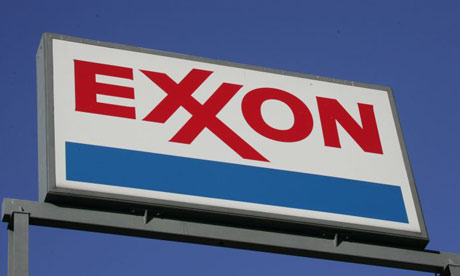ExxonMobil profits slump to $19bn
The rich get richer, the poorer get screwed
The world's largest publicly traded oil company grappled with declining margins at its refineries and weaker demand for fuel in recession-battered economies

Exxon still made almost $53m a day. Photograph: Donna Williams/AP
The world's largest publicly traded oil company, ExxonMobil, saw its profits slump to $19bn (£11.9bn) in 2009 from $45bn as it grappled with declining margins at its refineries and weaker demand for fuel in recession-battered economies.
Oh, declining margins, huh?
Exxon's profits were its smallest for seven years and amounted to a sharp return to earth after the Texas-based energy empire smashed America's all-time record for corporate earnings in 2008. But they still amounted to earnings of nearly $53m a day.
Exxon's chief executive, Rex Tillerson, said he was satisfied with the firm's profits in a tough climate: "Despite continuing difficult global economic conditions, ExxonMobil delivered strong business results and built on our long-term focus." While millions starved, it should say.
The figures came out nearly two months after Exxon announced that was splashing out $41bn to purchase XTO, a specialist in natural gas, in an effort to diversify away from a traditional reliance on oil which was viewed as a potential bet on the direction of energy policy.
Tillerson described the XTO deal as a driver of long-term value, saying it would "enhance ExxonMobil's position in the development of unconventional resources". And drive up the price of stock for investors!!
Exxon's upstream earnings, comprising exploration and production, fell by $16.7bn to $17.1bn. Oh no!! Although Exxon's output was up, profits were hurt by lower oil and gas prices on the world's commodity exchanges.
Meanwhile, downstream earnings, including refining and distribution, tumbled by $6.4bn to $1.8bn, including a $153m loss in the US, as sales of petroleum products fell by 5% to 6.4m barrels per day. The recession has prompted a drop in factory activity, reducing fuel demand, and has prompted the public to focus on energy efficiency, with some choosing smaller cars and insulating their homes in order to economise.
In the final quarter of the year, the company's profits dropped 23% to $6.05bn.
Exxon is frequently lambasted by environmental organisations for its reluctance to invest significantly in alternative forms of energy. The company has been more sceptical than its rivals in the energy industry about the potential of wind, solar and other alternatives to fossil fuels. But under pressure from shareholders, Exxon's position has shifted in recent years and the company has stepped back from funding groups sceptical of climate change.
Kert Davies, research director at Greenpeace US, pointed out that in spite of its lower profitability, Exxon still spent $27.4m lobbying federal lawmakers in Washington last year about energy policy. This was only a slight drop on 2008's expenditure of $29m, according to figures compiled by the non-partisan Centre for Responsive Politics.
"While their profits may be down, their efforts to change the policy debate in Washington DC are as high as ever," said Davies, who added that evidence that the recession was prompting energy efficiency was good news. "If people are turning to conservation as an economic choice right now, we're generally pleased about that."
(some editorial comment added)
.jpg)